★★★
“Turnabout is fair play”
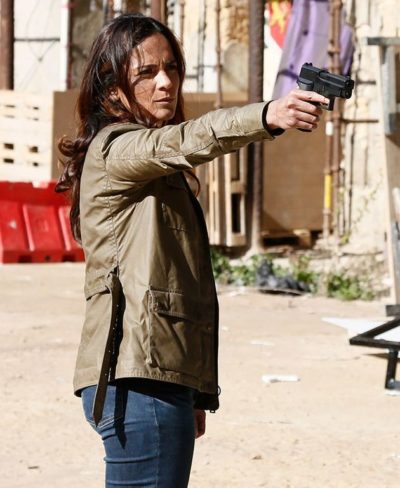 We arrived here with Teresa Mendoza (Braga) having gunned down Don Epifanio, and made an implacable enemy of his estranged wife, Camila Vargas (Falcon). Epifanio had become the Governor of Sinaloa, a position Camila took over, using it to buttress her position at the top. She formed alliances on both sides to assist her further: notably General Cortez (Arias), who provided military muscle, and with DEA agent Alonzo Loya, to whom she fed intelligence about her rivals. However, Camila’s increasingly strained relationship with her teenage daughter ends up being used against her.
We arrived here with Teresa Mendoza (Braga) having gunned down Don Epifanio, and made an implacable enemy of his estranged wife, Camila Vargas (Falcon). Epifanio had become the Governor of Sinaloa, a position Camila took over, using it to buttress her position at the top. She formed alliances on both sides to assist her further: notably General Cortez (Arias), who provided military muscle, and with DEA agent Alonzo Loya, to whom she fed intelligence about her rivals. However, Camila’s increasingly strained relationship with her teenage daughter ends up being used against her.
Meanwhile, Teresa is on the run after killing Epifanio, and is holed up in Malta for the first few episodes, before returning to try and set up shop in Arizona. This is a process fraught with difficulty, as she has not only to deal with La Comisión, the narco-committee who currently run things, but also corrupt local sheriff Jed Mayo (an amusingly thinly-disguised version of notorious actual Arizona sheriff Joe Arpaio). Further problems ensure when her supplier, El Santo (Steven Bauer) summons her to Colombia in order to find and address a traitor, an encounter which leaves Teresa in need of a new supplier. Then, with the tables turned and the roles reversed, Camila being on the run, she contacts Teresa to make an offer of a replacement product source – in exchange for taking out Camila’s foe.
The first few episodes, when Teresa is faffing around in the Mediterranean are very disappointing. It feels more as if the cast and crew wanted a holiday somewhere pleasant, rather than it fitting into the gritty scenarios which were a strong point over the first two seasons. My other major complaint about this season is the feeble attempt to represent Phoenix and Arizona. As someone who lives there, I can assure you that Phoenix is nowhere near as… arboreal as is depicted here. Trees. Trees everywhere. It looks like the season was mostly filmed in Dallas, as for the first two series, which explains a lot and is rather irritating. Rather than fake it badly, come to sunny Arizona and film here, dammit!
Grumbling aside, it did improve in the second half, after the roles were reversed and it was Camila who was scrambling to find shelter from her enemies. It was a nice switch, and a harsh reminder for those living in the narco-universe, that you can’t trust anyone, no matter how close they may be to you. I was pleased to see a definitive resolution to the love-triangle between Teresa, James (Gadiot) and the boyfriend from her previous life, Guero. We also enjoyed the ongoing quirkiness of King George (Ryan O’Nan), though the final episode showed a VERY dark and vengeful side to his character. On the other hand, the guest appearances by rapper Snow Tha Product and her microbladed eyebrows… Well, we ended up derisively referring to her as “Miss Tha Product”.
It all finishes in a relatively tidy fashion, rather than the semi-cliffhanger which marked the end of series two, and it would be an adequate way to draw the line if that turns out to be the end of the show. The status of a fourth series is uncertain, a notable change from last time, where its renewal was announced before the season finale was broadcast. However, the rating for this series were only fractionally lower than the second set, and in the key 18-49 demographic it was USA Network’s most-watched renewal [as opposed to new programs]. I’d not be at all surprised to see Teresa return once more, and at least the strong nature of the second half bodes better for a fourth season than if it had gone in the other direction.
Star: Alice Braga, Veronica Falcon, Peter Gadiot, Yancey Arias
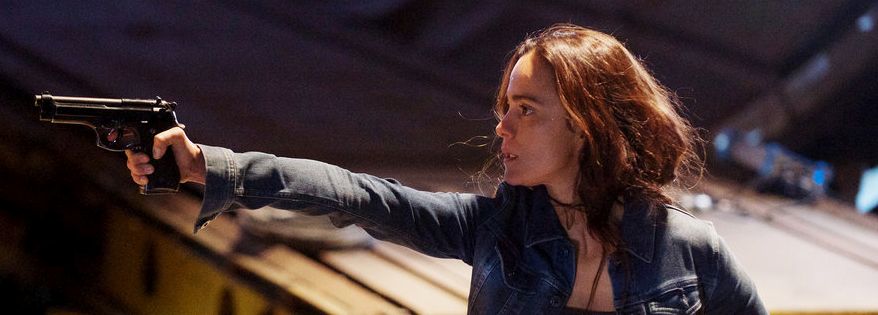





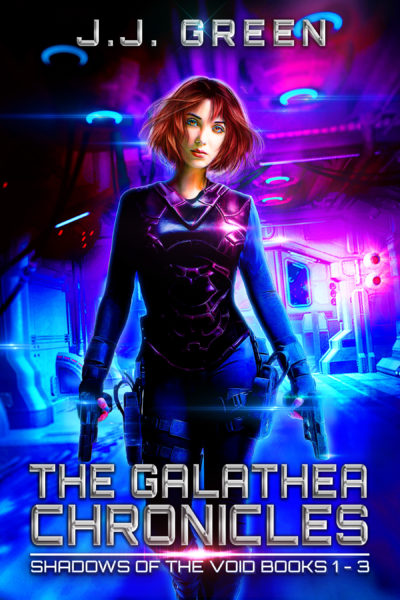 This compendium gathers together the first three (shortish) parts of Green’s Shadows of the Void series. In this, humanity has to face a malevolent alien species, the Shadows, which capture their victims, then take their shape in order to lure in more people. In these books, the threat is known but being largely kept under wraps, which is why it comes as a surprise to Jas Harrington. She’s the security officer on board a private exploration ship, sent out by the Polestar corporation to find new worlds to exploit. They find what appears to be a prime target, yet Harrington can’t shake the feeling something is wrong with the planet. Over-ruled by the ship’s captain, it turns out she was right – but by that point, the captain and almost all the officers have been replaced by their doppelgängers.
This compendium gathers together the first three (shortish) parts of Green’s Shadows of the Void series. In this, humanity has to face a malevolent alien species, the Shadows, which capture their victims, then take their shape in order to lure in more people. In these books, the threat is known but being largely kept under wraps, which is why it comes as a surprise to Jas Harrington. She’s the security officer on board a private exploration ship, sent out by the Polestar corporation to find new worlds to exploit. They find what appears to be a prime target, yet Harrington can’t shake the feeling something is wrong with the planet. Over-ruled by the ship’s captain, it turns out she was right – but by that point, the captain and almost all the officers have been replaced by their doppelgängers. That’s the voice-over with which this starts, segueing into a bit of nude interpretive dance – well, semi-nude, the guy keeps his Y-fronts on, for which I am grateful – that has absolutely no relation to the rest of the film. At its core, this is a battle of triad versus triad: one overseen by Lau, the other by Fung. The former is assassinated, and his daughter, Angel (Yeung) takes over – she’s also keen to track down the perpetrators, with the most obvious beneficiary being Fung. But not so sure is Fung’s right-hand man, Jimmy Lee (Lee), who was there for the killing, and helps Angel’s investigation.
That’s the voice-over with which this starts, segueing into a bit of nude interpretive dance – well, semi-nude, the guy keeps his Y-fronts on, for which I am grateful – that has absolutely no relation to the rest of the film. At its core, this is a battle of triad versus triad: one overseen by Lau, the other by Fung. The former is assassinated, and his daughter, Angel (Yeung) takes over – she’s also keen to track down the perpetrators, with the most obvious beneficiary being Fung. But not so sure is Fung’s right-hand man, Jimmy Lee (Lee), who was there for the killing, and helps Angel’s investigation. This is a modern update of the story of Savitri and Satyavan, originally found in Indian epic saga the Mahabharata [and when I say, “epic saga”, it’s 1.8 million words long!]. The tale has been an immensely popular topic for Bollywood, Wikipedia saying there have been thirty-four different film versions, dating back over a century to 1914’s Satyavan Savitri. The basic story is of a woman, Savitri, who defies a prediction that her chosen husband, Satyavan, will die in a year, and marries him anyway. She then has to talk the god of death out of collecting him.
This is a modern update of the story of Savitri and Satyavan, originally found in Indian epic saga the Mahabharata [and when I say, “epic saga”, it’s 1.8 million words long!]. The tale has been an immensely popular topic for Bollywood, Wikipedia saying there have been thirty-four different film versions, dating back over a century to 1914’s Satyavan Savitri. The basic story is of a woman, Savitri, who defies a prediction that her chosen husband, Satyavan, will die in a year, and marries him anyway. She then has to talk the god of death out of collecting him.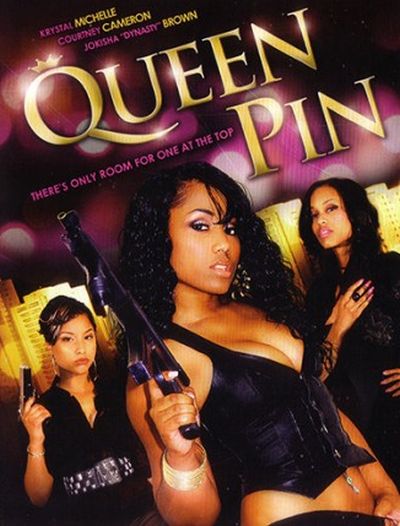 Rhanni (Brown) falls for the notorious Florida drug-dealer Seven (Bird) hard – to the extent she’s prepared to overlook the fact he’s married. Instead, she becomes his best friend, and works alongside him in the pharmaceutical business. When he is gunned down by his rivals, Rhanni decides to take what she has learned and put it into practice. She assembles her team of loyal but brutal associates, and sets out to take over the town. This brings her unwanted attention from two groups. Firstly, the authorities, who are always seeking to snare one of her underlings, and get him to snitch on his boss. More lethally, there’s the mysterious “Genie”, the current top dog, whose face no-one has seen. Genie sends Lil’ Miller (Michele) to take out Rhanni, only for the hitwoman to throw her lot in with the intended target.
Rhanni (Brown) falls for the notorious Florida drug-dealer Seven (Bird) hard – to the extent she’s prepared to overlook the fact he’s married. Instead, she becomes his best friend, and works alongside him in the pharmaceutical business. When he is gunned down by his rivals, Rhanni decides to take what she has learned and put it into practice. She assembles her team of loyal but brutal associates, and sets out to take over the town. This brings her unwanted attention from two groups. Firstly, the authorities, who are always seeking to snare one of her underlings, and get him to snitch on his boss. More lethally, there’s the mysterious “Genie”, the current top dog, whose face no-one has seen. Genie sends Lil’ Miller (Michele) to take out Rhanni, only for the hitwoman to throw her lot in with the intended target. I have not seen any of the entries on the male side of the Ocean’s franchise, so can’t say how this compares. Maybe it would have helped – I sense there were efforts to tie them together, with a pic of George Clooney (whom I assume played the late brother of Bullock’s character). Maybe it would have hindered – even with my ignorance of the series, the heist movie we get here seems more than slightly familiar. The obvious touchstone here is the gender reversal of Ghostbusters, though while that was a reboot of the franchise, this is just another entry. Female-led, to be sure, but part of the universe, rather than writing over it. Perhaps that explains why this didn’t receive a fraction of the backlash; the lack of any significant, pre-existing rabid Ocean’s fanbase is perhaps also a factor.
I have not seen any of the entries on the male side of the Ocean’s franchise, so can’t say how this compares. Maybe it would have helped – I sense there were efforts to tie them together, with a pic of George Clooney (whom I assume played the late brother of Bullock’s character). Maybe it would have hindered – even with my ignorance of the series, the heist movie we get here seems more than slightly familiar. The obvious touchstone here is the gender reversal of Ghostbusters, though while that was a reboot of the franchise, this is just another entry. Female-led, to be sure, but part of the universe, rather than writing over it. Perhaps that explains why this didn’t receive a fraction of the backlash; the lack of any significant, pre-existing rabid Ocean’s fanbase is perhaps also a factor.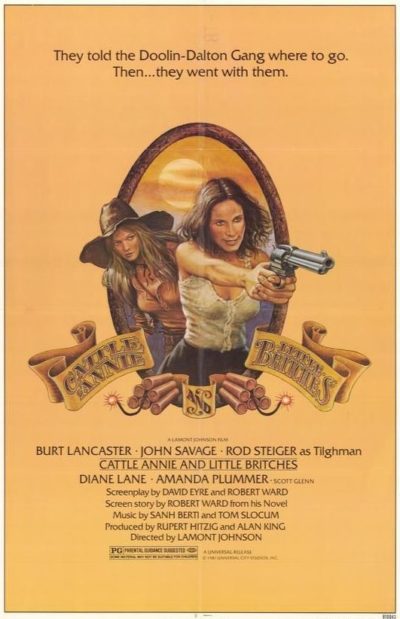 For example, rather than being born and brought up in Oklahoma, the duo are portrayed as making their way out to California to seek their fortune, when they’re forcibly detoured to Guthrie, OK, There, they encounter Bill Doolin (Lancaster) when he and his gang visit the town. Annie falls for gang member Bittercreek Newcomb (John Savage) and they end up being taken by him to the gang’s hideout. Their knowledge of the Doolin Gang is entirely based on the embellished stories they’ve heard about them, and they’re disappointing to find reality comes up short.
For example, rather than being born and brought up in Oklahoma, the duo are portrayed as making their way out to California to seek their fortune, when they’re forcibly detoured to Guthrie, OK, There, they encounter Bill Doolin (Lancaster) when he and his gang visit the town. Annie falls for gang member Bittercreek Newcomb (John Savage) and they end up being taken by him to the gang’s hideout. Their knowledge of the Doolin Gang is entirely based on the embellished stories they’ve heard about them, and they’re disappointing to find reality comes up short.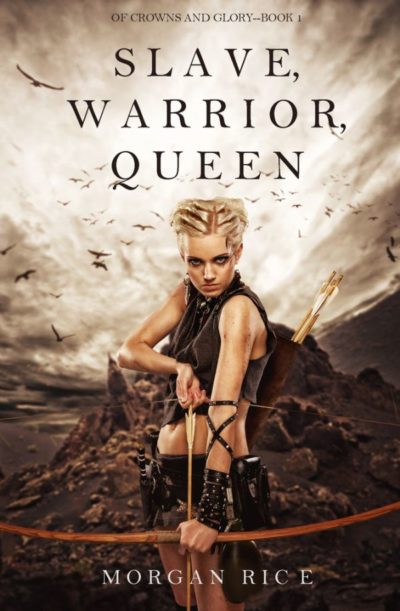 author is certainly prolific: this series, Of Crowns and Glory is eight books, yet only her
author is certainly prolific: this series, Of Crowns and Glory is eight books, yet only her  This dates back to 2006, and was somewhat groundbreaking at the time, due to the very high volume of digital effects and CGI background work – it came out was three years before Avatar, as a yardstick. The key word here, however, is “volume”. For the effects make up for in quantity what they largely lack in quality, although you have to be impressed at the sheer ambition on view, especially when you don’t have a fraction of the resources which were available to James Cameron. More problematically, also missing is the skill necessary to handle a narrative, where there is simultaneously too much and not enough going on. The former is apparent in entire universe building which has to be accomplished in hard to digest expository chunks, and the latter makes itself known, courtesy of long stretches which are as devoid of interesting features as the Arizona landscapes in which they were shot.
This dates back to 2006, and was somewhat groundbreaking at the time, due to the very high volume of digital effects and CGI background work – it came out was three years before Avatar, as a yardstick. The key word here, however, is “volume”. For the effects make up for in quantity what they largely lack in quality, although you have to be impressed at the sheer ambition on view, especially when you don’t have a fraction of the resources which were available to James Cameron. More problematically, also missing is the skill necessary to handle a narrative, where there is simultaneously too much and not enough going on. The former is apparent in entire universe building which has to be accomplished in hard to digest expository chunks, and the latter makes itself known, courtesy of long stretches which are as devoid of interesting features as the Arizona landscapes in which they were shot. McCarthy appears to be Feig’s muse, having starred in his last four movies, from Bridesmaids through this, and then on to
McCarthy appears to be Feig’s muse, having starred in his last four movies, from Bridesmaids through this, and then on to